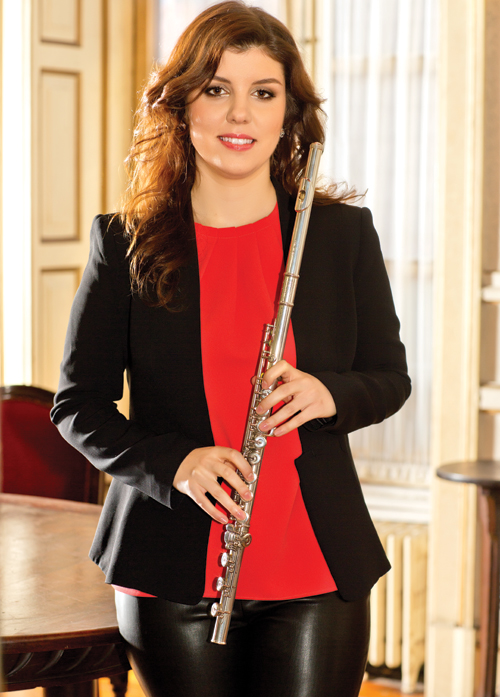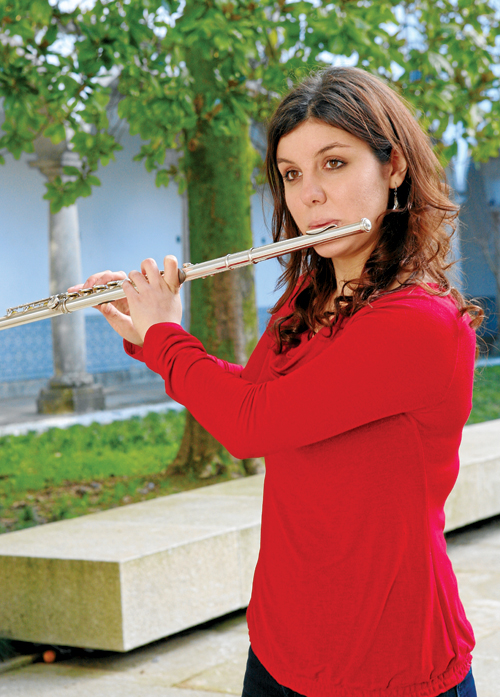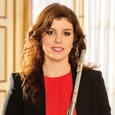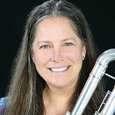
Born in a small town in Portugal, Adriana Ferreira participated in the Concours de Genève Flute during the last two weeks of November 2014. She performed ten pieces on four programs. While the first prize was not awarded, Ferreira tied with Yubeen Kim for second prize. She also won first prize in the Gazzelloni Competition in 2014. She has previously been awarded first prize in the 2010 Nielsen Competition and third place in the Kobe Competition in 2013. Ferreira is currently playing co-principal flute in the National Orchestra of France.
How did you begin playing flute?
I started playing the flute by chance. When I was six years old, I asked my parents if I could play the piano. They found a teacher and I began lessons. Then, when I was eight, after watching a local amateur band playing in the street, I asked if I could join the wind band. I was given some lessons without an instrument, but they soon decided to give me a piccolo. They had a vacant flute position, but I was very small and could not hold a flute, so they bought me a piccolo. I started playing and took lessons with the conductor and another musician in the band, who were both clarinet players. Two years later my parents bought me a flute. I remember I had to play Rossini’s William Tell Overture flute solo in the band the day I got the flute. There was not a music school in my small town, so a year later I took an audition for a professional music school, Artave, and was accepted. When I was twelve, I moved with my parents to the city of Vila Nova de Famalicão to study flute at this school.
What were the steps that took you to the National Conservatory in Paris at age 17?
I entered the flute class of Joaquina Mota in Artave when I was twelve. I had already studied piano for six years, so I continued with it as a second instrument. When I was thirteen, my teachers often spoke about string players, so I entered the CCM Conservatory, near Artave, to learn the violin. It was difficult, and for me it was clear that the flute was my real instrument.
When I was fourteen, I auditioned for the European Union Youth Orchestra and was admitted into the Summer School, so I got to play Mahler’s 7th Symphony under Bernard Haitink in Porto. That is something that I will never forget. I could not have started my orchestra experience in a better way and I met such wonderful young players who encouraged me to study abroad.
I also attended some masterclasses in Portugal that were very influential, especially one with Michel Debost and another with Vicens Prats. Both told me that I should continue my studies abroad, if possible in Paris. So, three years later, as I was finishing high school, I auditioned for both the Royal Academy of Music in London and the Paris Conservatoire. I was admitted to both and decided to continue my studies in France, with a scholarship from the Calouste Gulbenkian Foundation (Lisbon).
What was it like to study at the Sorbonne, the Paris Conservatory, and as an exchange student at the Hans Eisler Academy in Berlin?
At the Sorbonne University, I studied and received a bachelor’s degree in Musicology. Besides that, I completed a bachelor’s degree, a master’s, and am finishing the 3rd cycle called Artist Diplome in flute at the Paris Conservatoire. I did the exchange in Berlin through the conservatoire. So I spent two years in Paris, one year in Berlin and then returned to Paris where I finished the master’s in flute and am now completing the Artist Diplome.
In the Paris Conservatoire, I took flute lessons with Sophie Cherrier. We had to prepare a new concerto or sonata each week, plus an etude. We had a one-hour lesson each week. At the beginning that was quite new for me because during my studies in Portugal, I had more than one week to prepare pieces. Now I realize how important this routine was for me because I now feel more confident that I can learn a new piece much faster. In lessons with Vincent Lucas, we played tone and technique exercises as well as orchestral excerpts. We had two one-hour lessons per month. Some technique books were the core of study: Paul Taffanel & Philippe Gaubert Exercices Journaliers (Vol. 4), Matthieu André Reichert 7 Exercices Journaliers and Arrigo Tassinari Esercizi Tecnici di Perfezionamento. I also chose to have piccolo lessons with Pierre Dumail and Baroque flute lessons with Jan de Winne.
Now in the 3rd Cycle, the Artist Diplome, I am specializing in contemporary music, so I am no longer in the flute class. I play mostly contemporary chamber music under the direction of Hae-Sun Kang, a violinist. This has been such a discovery, but unfortunately because of my orchestra work, I cannot be as present as much as I would like to be. However, working with composers, giving the premieres of some works, and playing with electronics has been a real fantastic challenge. I worked for one year with two composers at the IRCAM in Paris, and we premiered their pieces there, one for piccolo and electronics (I was told it was the first piece ever for this combination), and another for bass flute and electronics. That was amazing, I learned a lot about the possibilities we have today in music. (IRCAM is the French Institute for Science about Music and Sound, founded by Pierre Boulez in 1977.)
At the Hanns Eisler Academy in Berlin, in the flute class of Benoît Fromanger, the organization was similar. We always had an etude lesson, where we played only etudes, and another lesson playing repertoire, normally the following day. The etude lesson was really challenging, but very important.
In both schools the flute class is always listening to the lessons of their colleagues, like in a masterclass. For five years until the end of my master’s degree, I listened to almost all the lessons of the other flutists in the class, and it was a fantastic way to continue absorbing what I learned in my own lessons. In the same way, always having an audience was very valuable and helped me to feel comfortable on stage.
What words of advice did your flute professor Sophie Cherrier give you about competitions that you found especially helpful?
She is a great music professor, but she also cares a lot about our human side. She always told me (and the class in general) that we should only enter a competition or take an orchestra audition if we have achieved a high level of ability and if we are prepared. Too many competitions or doing them too early, can destroy someone’s goals and musical personality. On the other hand, she always tells me to be positive – for getting through the first round, for playing a piece that I like in public (even if it’s in a competition), for always trying to do my best. These words of advice are really valuable to me.

How did you come to play with the French National Orchestra?
I got this job when I was 21 and started the six month trial the day of my birthday, when I turned 22. On that day, the orchestra played the “Happy Birthday” song at the beginning of the rehearsal for me. That week I was playing first flute, and the program included the Beethoven Leonore Overture No. 3 and A Hero’s Life by Richard Strauss. Our main conductor, Daniele Gatti, was conducting that week, and it was the opening concert of the season of the Champs Elysées Theater in Paris. I think I have still never felt such responsibility as on the day of that concert. Being in the orchestra meant that what I was playing was just not important for me, but for the group. For the first time I felt that I was part of a micro-musical-society and felt very satisfied and grateful for that.
It is becoming more common in Europe to appoint co-principal players in an orchestra. How does that work in the National Orchestra of France?
Yes, in the majority of the European orchestras there are two principals, but in my orchestra there is a different variation on this. I haven’t found a similar one anyplace else. There is a Super Soliste (Principal), who plays in half of the program and decides in which concerts he or she performs. Then, there are two Solistes or Co-Principals; I am one of them. We share the other half of the program, so we each play first in a quarter of the program, and we also play second. There are two piccolo players who also play second. One of the requirements of my job is that I also play the alto flute parts, and I am very excited about that. I really enjoyed playing the alto flute part in the Rite of Spring by Stravinsky. At the beginning I thought I wouldn’t like the instrument but I discovered I do.
One of the things that I like the most in my job is the flexibility in that I get to play first, second, alto and occasionally piccolo. That really helps me understand the function of what I am playing. Now, when I play solo pieces, I hear in a different way. I am much more aware of the musical relevance of what I am playing (melody, harmony, accompaniment, general texture, etc.)
What words of advice would you give to flutists thinking of entering competitions?
I would tell them to do it because of the pieces they are going to learn and because they will play fantastic music with others. The most important part is learning and the journey, and that is independent of the results.
What are the benefits of competitions and what are the negative aspects?
For me, the preparation, the amount of repertoire needed and the aspects I learn about music and myself are the most important things about competitions. On the other hand, doing a competition is really very tiring and stressful. However, those aspects only help us to build ourselves better as musicians and flutists.
How did you prepare for the Geneva Competition?
Since I was playing in the National Orchestra of France, I found it more difficult to prepare for that competition because I didn’t have as much time to practice as I had before. My colleagues in the orchestra were very helpful and found ways to give me more time to practice. I was still studying at the Conservatory at the time, so I prepared the Geneva competition under my professor, Sophie Cherrier. At the end of July 2014, I was attending the James Galway Flute Festival in Switzerland and after his class, I started working. At the same time, I was preparing for the Severino Gazzelloni competition in Italy that fortunately included some of the same pieces. Then in September I started work with my orchestra, so I prepared the repertoire for Geneva during some free weeks I had in October and November.
You had to perform a total of ten pieces and nearly everything had to be played from memory. How did you accomplish this?
Ever since I started playing the flute, my teachers have always insisted on playing by memory, so I am quite comfortable with that. In general, when I know a piece by heart, I play it better, as I feel really free. In the third round, we did play with the music for the Debussy Sonate for Flute, Viola and Harp and the contemporary music piece for solo flute and ensemble that won the 2013 Geneva Composition competition.
What were your favorite pieces at the Geneva Competition?
My favorites were the Claude Debussy Sonate for Flute, Viola and Harp, the Luciano Berio Sequenza and the Händel Halle Sonate No. 3. (For a complete listing of the required repertoire for the Geneva Competition: http://www.concoursgeneve.ch/sections/flute_2014?a=collapse40)
How much time were you given to rehearse at the Geneva Competition?
The first round was flute solo, but then for the second round, I had two 30-minute rehearsals with harpsichord for a Händel Sonata and one hour rehearsal with piano for the Prokofiev and Demersseman. For the third round, I had a 90-minute rehearsal with the Ensemble Contrechamps for the contemporary music piece for solo flute and ensemble and a 45-minute rehearsal of the Debussy Sonate with Viola and Harp. For the final round, I had a 90-minute rehearsal for each concerto two days before, and a general rehearsal on the morning of the final.
Are there pieces you would like to learn but have not yet found the time?
Yes, the more I learn new pieces, the more I regret not having the time to learn more. To begin with, I would like to learn the J.F. Barnett Sonata that my colleague Michel Moragues has recorded and the Otar Taktakishvili Flute Sonata as soon as I have time, besides many chamber music pieces with strings. (J.F. Barnett (1837-1916) English composer. Student performance of the Sonata available at https://www.youtube.com/watch?v=ycwoFxkKMew.)
How do you structure your practice routine?
I enjoy starting my practice time with a melody. I think it is the best way to keep remembering, every day, why I chose to be a musician. Then I work on phrasing, staccato, breathing and other aspects through the gamme exercices of Taffanel and Gaubert. Most of the time, I have to say, I create my own exercises, depending on what I want to work on. I do a small exercise and then play it in every tonality. That is my way to keep practicing scales. Then I work on the solo and orchestra pieces that I have to prepare. Some books have been very helpful, especially the ones of Marcel Moyse and Trevor Wye and the three I worked on regularly in Paris – Reichert, Taffanel & Gaubert and Tassinari. Regarding tone exercices, I use the principle of playing small melodies as a way to improve my sound and changing colors, but of course, some books were very important, especially De la Sonorité by Marcel Moyse and the Tone, vol. 1 in Trevor Wye’s series.
What pieces did you perform at the 2011 NFA Convention in Charlotte?
I performed in the concert Flutists from Portugal, that also featured the Japanese flutist Kayoko Minamino who is principal flute in a Portuguese orchestra. I played the Francis Poulenc Sonata and the Andre Jolivet Chant de Linos with a fantastic pianist, Timothy Carrey. I also played the bass flute in Conversazione by Raymond Guiot in a concert dedicated to Trevor Wye with Kayoko Minamino, Tomomi Matsuo, Paul Edmund-Davies, and Ko-Yu Wang.
What are your upcoming plans?
I am preparing two CDs, one with the Geneva Chamber Orchestra and another with piano (because of the Gazzelloni competition). It is not yet decided what will be on them, but among others, I would like to record the Franz Doppler Hungarian Fantasy and an Antonio Vivaldi concerto.
Besides orchestra concerts, I am going to play a piccolo piece by Italian composer Franco Donatoni and a piece by Bach at the Monte-Carlo Spring Festival, four concerts in Portugal with Orquestra XXI, a project of Portuguese musicians living abroad, some excerpts at a Concert Promenade in an exhibition about Pierre Boulez at the Cité de la Musique in Paris, a concerto with the Geneva Chamber Orchestra, some recitals, and in six months both CDs should be recorded.






